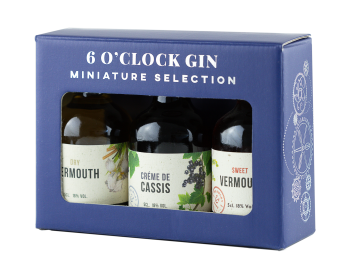
Everything You Need To Know About The Martini
If you’re anything like the team at our distillery, you will likely share the opinion that there’s no such thing as a party without some delectable gin-based cocktails to keep the good times flowing. This year, we are celebrating the tenth anniversary of our strikingly smooth London Dry and what better way to mark the occasion than with a series of simple, classic drinks, easy enough to make at home but decadent enough to impress even the fussiest of party guests. So, without further ado, let’s embark on our thirst-quenching journey and toast the past decade with the knees up it deserves.
We’re starting off with the Martini, which over the years has firmly cemented itself as a staple of any reputable bartender’s repertoire – a reputation which carries a certain amount of irony given that the perfect composition of this delicious concoction is so widely disputed. From the best style of gin to start with, to the volume and variety of vermouth, to how to combine the two (thanks, Mr. Bond!), everything is up for debate. One thing, however, is abundantly clear – when it comes to gin cocktails, the Martini is a classic and is here to stay.

The many variations and evolutions of the Martini make for a fitting analogy of today’s thriving British gin industry. With at least 441 distilleries registered with HMRC by the end of 2019[1] and each of those producing a host of gins of varying styles, flavours and intricacies, there is no one true way to enjoy gin. Each distillery has their own recommended serve, their own tasting notes, their own quirks and flourishes, and the same can be said for this opulent yet simplistic cocktail.
The 6 O’clock Gin ethos on Martini making mirrors the core principles we apply to everything we do: simplicity, quality and patience.
Is A Martini Made With Gin Or Vodka?
In terms of ingredients, the Martini is not a complex beast and we like to keep things as simple as possible by sticking to the core trifecta – London Dry Gin, Dry Vermouth and a simple garnish of your choosing to finish things off.
Being such a pared-down drink, the quality of your ingredients is pivotal in ensuring the quality of the end product. The smoothness of our London Dry lends itself perfectly to the Martini, and pairs delightfully with the gentle herbaceous notes of our Bramley & Gage Dry Vermouth. It is relatively universally accepted that a delicate balance of these two spirits should form the basis of every drink purporting to call itself a Martini, but The Guardian’s Felicity Cloake puts it, “the ideal ratio is a matter as personal, as individual, as how to make a decent cup of tea”[2]. For us, it’s a generous six parts gin to one part vermouth – gin, after all, should be the star of the show, complemented by the subtle sweetness and spice the vermouth brings to the equation.

For The Perfect Martini, Do You Shake Or Stir?
To shake or to stir… that really is the question. Since the release of Ian Fleming’s novel Diamonds Are Forever in 1956, in which the nation’s favourite secret service agent’s catchphrase made its debut, many may think there is only one, clear cut choice to this quandary. However, given that Bond’s preference tends to tip towards the vodka martini, which he orders 19 times throughout Fleming’s works compared to a mere 16 gin martinis, we have no choice but to doubt his powers of judgement and discount his preference for shaking all together.
The aim of either method, be it shaking or stirring, is to chill the drink, whilst achieving a suitable level of dilution – we are consuming straight spirits here after all! We prefer to stir our ingredients down over plenty of ice for at least 30 seconds, allowing gentle, controlled dilution and a refreshingly crisp chill to the final drink.
What’s The Perfect Martini Garnish?
Last but not least, we need a final flourish to perfect our Martini. After straining your concoction into a well-chilled coupe or martini glass, we would recommend garnishing with a simple twist of lemon, peeled and twisted over the glass to allow any escaping oils to spritz the surface of the drink. We opt for lemon, as it is a good accent to the citrus notes of our gin, but do feel free to experiment with other citrus peels, or even a green olive for a more savoury affair.
The resulting cocktail should be crisp, clean and warming from the first sip to the last – a great sipper which, when made well, will be the envy of any rival dinner party host. Cheers!

[1] https://www.wsta.co.uk/archives/press-releases/statistics
[2] https://www.theguardian.com/lifeandstyle/2015/oct/29/martini-recipe-classic-perfect




